The 'nasty' computer virus infecting U.S. military drones
Unmanned aircraft used by the Air Force for espionage and combat have been stung by malware. Should we be worried?

A free daily email with the biggest news stories of the day – and the best features from TheWeek.com
You are now subscribed
Your newsletter sign-up was successful
A fleet of American Predator and Reaper drones has been infected with a computer virus, reports Noah Shachtman at Wired. The unmanned aircraft, which allow the military to attack targets without risking the lives of U.S. soldiers, have become a key tool in America's war on terrorism. Since President Obama took office, drones have killed more than 2,000 suspected militants and civilians. But now, it's the drones that are being targeted. Here's what you should know:
What does the virus do?
It's a "nasty" virus called a keylogger, says Max Eddy at Geekosystem. Pilots maneuvering drones issue commands remotely with keyboards and joysticks. And this virus can record every single keystroke.
The Week
Escape your echo chamber. Get the facts behind the news, plus analysis from multiple perspectives.

Sign up for The Week's Free Newsletters
From our morning news briefing to a weekly Good News Newsletter, get the best of The Week delivered directly to your inbox.
From our morning news briefing to a weekly Good News Newsletter, get the best of The Week delivered directly to your inbox.
How dangerous is this?
Because hackers might use any new information to refine their tactics, the Air Force doesn't publicly discuss attacks on its computer networks, says the Washington Post. But Wired's Shachtman says the infection has hit classified and unclassified machines at Creech Air Force Base in Nevada, which at least raises the possibility that secret data may have been captured — though no specific reports of classified information leaks have yet surfaced.
Where did the virus come from?
It's not clear if the virus infiltrated the military's computer systems through "a typical infection, or if it was specifically created to target the drone computer control system," says Dean Takahashi at Venture Beat. In other words: No one knows for sure how it got there.
A free daily email with the biggest news stories of the day – and the best features from TheWeek.com
What now?
Computer specialists at Creech are still trying to wipe the virus off their machines. Thus far, they've reportedly been unsuccessful, as the virus resists every effort to eliminate it. Officials are also in the process of erasing their internal hard drives to rebuild them from scratch — a rather "time consuming effort," says Shachtman.
Sources: Wired, Geekosystem, Venture Beat, The Washington Post, The Atlantic
-
 The week’s best photos
The week’s best photosIn Pictures An explosive meal, a carnival of joy, and more
-
 The ‘ravenous’ demand for Cornish minerals
The ‘ravenous’ demand for Cornish mineralsUnder the Radar Growing need for critical minerals to power tech has intensified ‘appetite’ for lithium, which could be a ‘huge boon’ for local economy
-
 Why are election experts taking Trump’s midterm threats seriously?
Why are election experts taking Trump’s midterm threats seriously?IN THE SPOTLIGHT As the president muses about polling place deployments and a centralized electoral system aimed at one-party control, lawmakers are taking this administration at its word